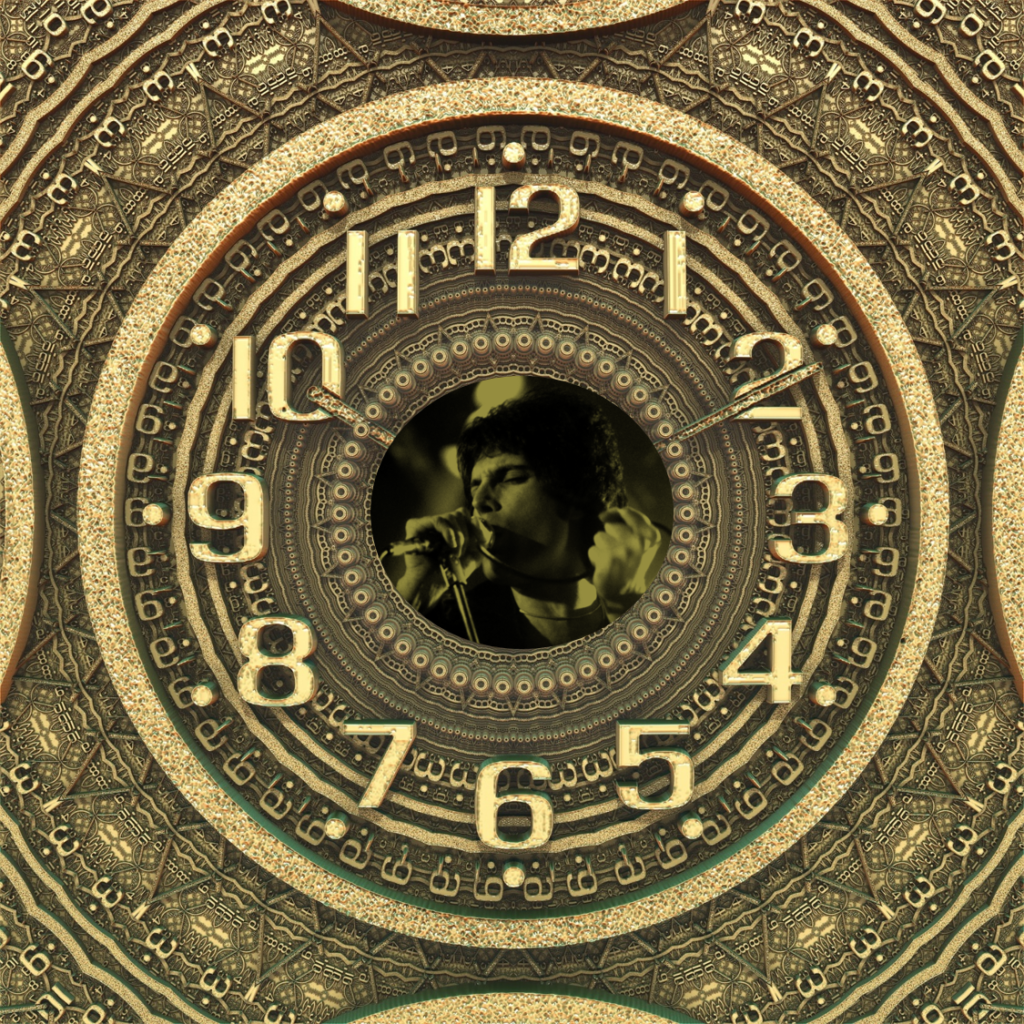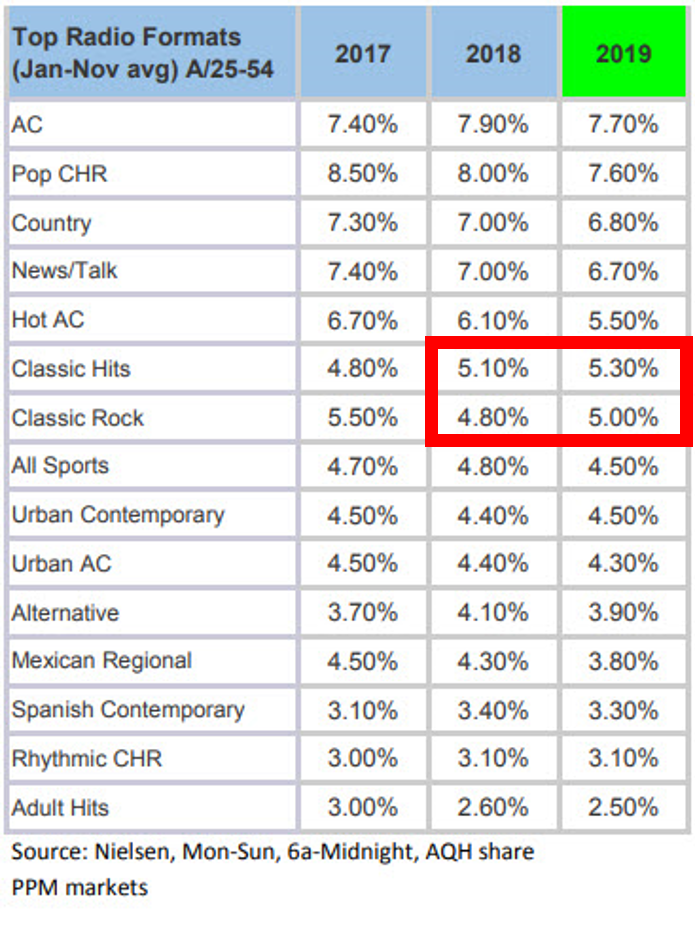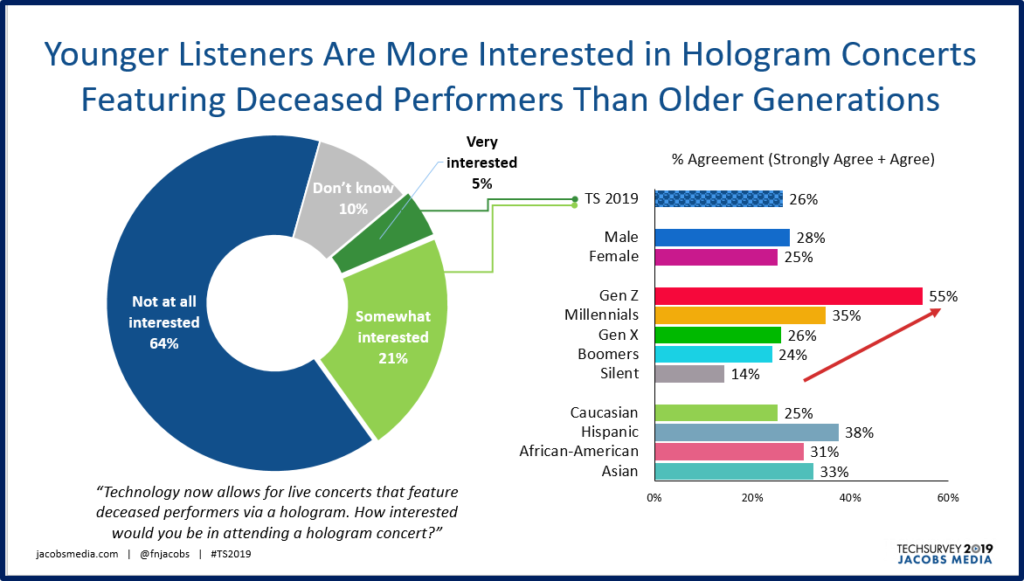
A regular topic in this blog is Classic Rock – the music, the format, and the culture.
And why not? Classic Rock has been a driving force in our company since we put the format on the map in the mid-80’s. Back then, the conventional wisdom was “It will never last.”
It wasn’t just radio people doing the naysaying. It was the entire record label community, lamenting the format’s initial burst of popularity and buzz. Back then, catalogue sales was, at best, a cottage industry. Their entire focus was on breaking new music. And as Classic Rock grew and proliferated, an unintended consequence was less new rock on the radio airwaves.
Well, here we are 35 years later, and the format is going strong. Earlier in the week, Inside Radio and other trades printed format trends for 2019 from the Nielsen data bank. While nearly every format has been heading south, Classic Rock and Classic Hits have generally been headed in the opposite direction. And both are finishing the year in a strong position in many of the nation’s largest and most competitive markets in the demographic – 25-54 Adults – radio cares most about:

Not bad, right?
There’s a lot of money being made in the Classic Rock ecosphere. Just in time for Christmas, Hanukkah, Kwanzaa, and Festivus (did I miss anyone?), Sony has cut what appears to be an amazing deal on Beatles merch.
A publication that knows a little something about finance – the Wall Street Journal – reported last week about a breakthrough merch deal between Sony Music Entertainment and a 1960’s band you may have heard of.
The Beatles.
Neither side disclosed the deal details, but Sony has already set up a pop-up store in New York City to capitalize on what WSJ writer Anne Steele refers to as a “rising interest in music merchandise.”
We saw that in this year’s Techsurvey – a point that should not be lost on some of the better radio station brands out there.
And then there’s this pronouncement from no less than Rolling Stone:
“The clock may be ticking on classic rock, but as bands evolve into brands, they’re finding endless renewability.”
That’s another way of saying the genre isn’t just sustainable, it has evolved. Not bad for a format where rock star deaths have become more and more prevalent.
Of course, that trend will continue, but as writer Kory Grow points out, there are several factors contributing to the format’s resilience and continued success:
1. Replacements – Not every Classic Rock band can pull this off, but Adam Lambert filling in for Freddie Mercury has been beyond well-received. As Brian May pointed out, “Being in Queen now feels like the old times because it has become as big as the old times.”
https://www.youtube.com/watch?v=kTB7x9AfWNU&list=PL2tMgWgIvcWm43buGy5qfDwO38eq3T7vY&index=2
Queen is not a one-off. While Don Henley was sure the Eagles were finished after Glenn Frey passed away four years ago next month, Vince Gill and Frey’s oldest son, Deacon, have filled in admirably.
2. Biopics and docs – Of course, there’s “Bohemian Rhapsody,” the film at the cornerstone of Queen’s comeback. But “Rocketman” – while not as mass appeal – introduced new fans to Elton John, while fueling the box office for his final tour. Motley Crue’s doc on Netflix – “The Dirt” – exposed the band to scads of consumers who saw the band in a whole new way. As the years roll on, the list will go on and on because these efforts tend to be popular – and profitable.
3. Residencies – These are getting bigger and bigger – a way for aging Classic Rockers to stay fresh on concert tours – becasue they don’t move. Las Vegas is the key destination, and residencies have included Aerosmith and Guns N’ Roses. But then there was Bruce Springsteen’s amazing Broadway run – 14 months- a different kind of residency and stage show that gave even his most ardent fans a way to see him in an entirely different format. And yes, it also became a Netflix special.
4. Holograms – We’ve blogged about this before, including tours for Ronnie James Dio, Frank Zappa, and Roy Orbison. And we even asked about their viability in our last Techsurvey.

More than one in four respondents expressed interest in hologram tours. And as you can see in the demographic groups, enthusiasm grows among the younger end of the generational spectrum – a great sign for a format where radio programmers are always concerned about the so-called “demographic cliff.’
The late Frank Zappa’s son, Ahmet, is now in control of his famous father’s brand. He’s been the most vocal supporter of these virtual concerts: “I do hope they become more of the norm.”
5. Technology – The confluence of multi-media and digital technology has provided numerous branding tools for Classic Rockers – books, films, music, merch (including online stores), social media, streaming, podcasts, festivals, subscription fan clubs. All these assets gives artists -and their estates – more room to carve out their own unique strategy, while connecting with their loyal fan bases.
Kristin Mulderig is with the management team working with Slayer’s next incarnation, and she calls it “legacy mode” – a fascinating place where more and more Classic Rockers are ending up.
6. The music – Rolling Stone dances around this important point, but none of this works without an incredible portfolio of music. Every band we’re talking about has a resume unmatched by many of the performers that came later – concerts, albums, and other work that has truly stood the test of time – on the radio and off. The fact we gladly watch Adam Lambert, Rami Malek, and Taron Egerton on stage and in films play the roles of our heroes isn’t much different than watching the Detroit Symphony Orchestra led by conductor Leonard Slatkin perform works that are well more than a century old. The music is outliving those who originally wrote and recorded it.
Kory Grow points out, “The whole idea of ‘what’s next?’ has rejuvenated classic rock from top to bottom.”
But perhaps the most telling quote in the Rolling Stone story is from Bruce Resnikoff, president and CEO of UMe:
“Everybody needs to think this way. Every band will approach it in a different way, but every legacy band has an opportunity to think much differently than they ever did and to work with their music and tell their story — movies are one way to tell a story, books, documentaries, and video streaming are other ways — to a much wider audience and in much bigger ways than they ever could. Everybody, in every aspect of this business, has to think differently than they once did.”
Including those who own, manage, program, and market Classic Rock radio stations.
- Media And Technology In 2025: Believe It Or Not! - April 18, 2025
- In Radio, You Just Never Know - April 17, 2025
- The Secret To Making A Great Podcast (And Great Radio) - April 16, 2025




You forgot one factor Fred – casinos. The proliferation of casinos has given new life to many acts. It’s also led to some fantastic partnerships between casinos and radio.
Steve, thanks to readers like you, the list is growing. Thanks for the reminder. Maybe I should start hanging out more in casinos!
I’m finding that the REAL struggle in keeping Classic Rock viable, is the unwillingness of men of a certain age, to accept that their music is that old, and moving to oldies stations. Now, we’re going into 2020, and there is a group, a group of men who are very much responsible for what we ALL hear on CR radio, unwilling to play music from the 90’s. Oh sure, they’ve been shamed into the Red Hot Chili Peppers, Nirvana and Soundgarden, but refuse to even admit that bands that aren’t grunge, should be on CR. Thank god for the East Coast and the “Not your daddy’s classic rock stations”. They will save the format. In order for any format to remain relevant to the target demo, you must evolve with your listener. That means that a CR target listener is my age. That means 80’s and 90’s. The 70’s need to be more cherry picked for a sound, not the band it is. The remainder of the songs belong on a classic hits station. Its time for these people to see past their record collection if they want this format to last and if they want it to continue to be viable.
Tammie, I’ve been accused of being one of “those guys.” I see it this way – there are many variants of the format – some delve into Grunge and beyond, others stay more purist, some rock harder, and others are more focused on the 80s. I think it’s a matter of what is strategically smart for a station/company, given who’s in the cluster and across the street. Thanks for the reminder there’s more to Classic Rock than the Doors and the Who.
A major factor is that most classic rock bands haven’t seen a royalty check in twenty years. Bands whose members literally aren’t speaking to each other are out touring today because of financial need.
Always sad to hear those stories, Bob – like the down & out athletes who have had to sell their Heisman Trophies or Super Bowl rings. Thanks for reminding us not everyone is doing as well as Paul McCartney.
Tribute / cover bands also big biz! Mr. Jimmy, Jason Bonham, Zepperella, Fleetwood Max….keeping the music alive.
You are so right, Bruce. I missed that one. In many ways, that’s the Detroit Symphony Orchestra, right? Thanks for the reminder.
Fred, thank you for your work and for keeping classic rock music alive.
It deserves the platform more than ever. Younger generations need to hear the quality of the writing, performance, and production. It’s important because it comes from a creative goldmine that will never be duplicated. Still influential, you can hear the influence in the younger new artist, still relevant.
Much appreciated, Billy. Thanks for checking in.
And yet there are very few AAA formats left. Many “Alternative” formats are struggling with poor ratings. A well programmed AAA type format would deliver a higher qualitative audience. I’m talking about “literate” quality artists and not the typical burned out Classic Rock playlist of 250 songs. AAA could attract 35-60 year old educated demos who would use Radio IF it offered some quality programming.
Classic Rock is still performing well – despite the tight playlists. To expand it fits audience demands, but requires the deft touch of a great PD and savvy airstaff. Yes, those are common characteristics for great AAA stations. Thanks, Lorne.
Too bad the 25 year old advertising agent can’t see it your way….
Yeah, those pesky Millennial media buyers! Thanks, Max.
Read this whole article and comments section and not one mention of the greatful dead and phish who not only are still very prevalent but have induce a resurgence in new jam bands. Rock is not dead in the alleys maybe just on main street. Vinyl sales have much to do with it as more and more people are collecting and hunting.
Good points all, Mr. Bender. Thanks for those reminders!